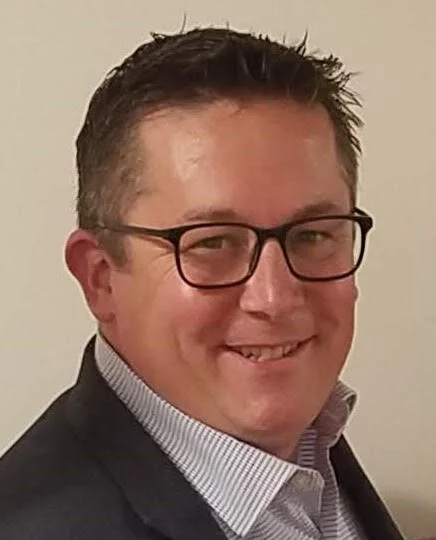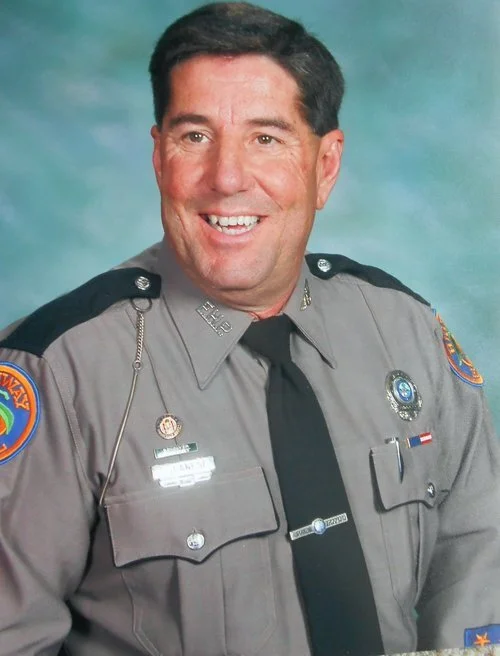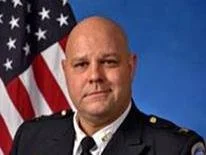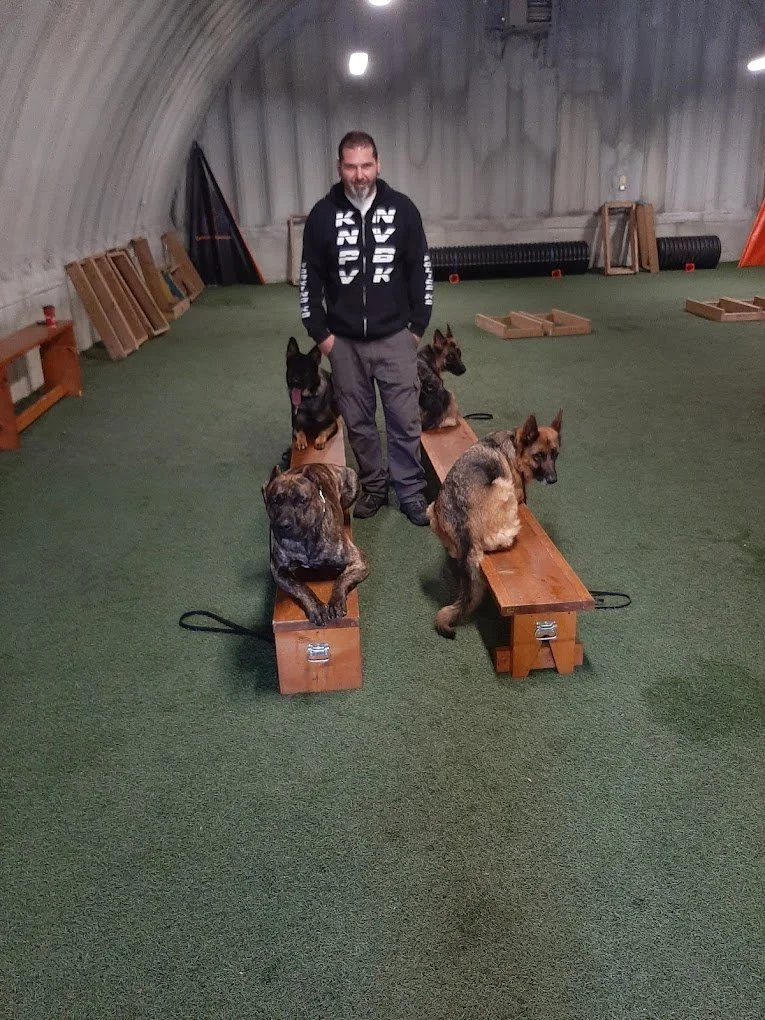Presenters
Chris Prochut
Chris Prochut (pro-hut) is a mental health advocate and law enforcement suicide prevention trainer.
Over the past nine years, Chris has had the honor to present to over 12,000 law enforcement officers across the United States and Canada on the topics of suicide and depression warning signs, medication myths, department policy revision, and told of his personal experience with the stigma of mental health issues. Chris has presented at many NAMI organized Crisis Intervention Team Trainings (CIT) where he addresses the subject of "Taking care of our own” and has been featured at various specialized law enforcement conferences advising departments on program development to assist officers at risk for suicide. Feedback from these trainings shows just how well received Chris’s message is, how the topics of suicide and mental illness are rarely discussed within law enforcement, and how education and training are causing a paradigm shift within police departments.
Chris is a member of the Wisconsin Law Enforcement Death Response (LEDR) Team, a former trainer in QPR (Question, Persuade, and Refer) suicide prevention program, a FBI National Academy (FBINA) Enrichment Speaker, a FBI National Academy Associates (FBINAA) Officer Safety and Wellness Committee Member, and an active volunteer with BringChange2Mind; an organization founded by Actress Glenn Close to end the stigma surrounding mental illness
Chris was recognized with the 2017 HOPES Award for his achievements in advancing suicide prevention in law enforcement by Mental Health America – Wisconsin.
In 2018, Chris was presented with an "Iris Award" by the National Alliance on Mental Illness (NAMI) of Wisconsin for his Outstanding Contributions, dedication, and support to promote the mission and vision of NAMI Wisconsin. Chris was also honored in June 2018 with the "Unsung Hero" Award presented by the FBI - Milwaukee Citizens Academy.
Chris resides in Hartford, Wisconsin with his wife Jennifer and their children Chase (16) and Ashlyn (12).
Taking Care of Our Own by Chris Prochut
Starting with a discussion of suicide and depression warning signs sometimes seen in police officers, we examine the paradigm shift taking place within law enforcement in which it is becoming increasingly OK to ask for help. Yet, stigma still exists and many officers fear they will lose their job if they seek mental health assistance. Addressed are the topics of stigma, the “suck it up” attitude lived by many officers, the myth that seeking help is a sign of weakness, and the reality that more officers die by their own hand than in the line of duty.
Brian Sallee
RETIRED DETECTIVE METH UNIT
ALBUQUERQUE POLICE DEPARTMENT
Brian Sallee has 39 years of law enforcement experience with over 30 years as a narcotics detective. Brian is currently assigned to the Meth Unit with the Albuquerque Police Department. He is cross-commissioned with the New Mexico Board of Pharmacy as an investigator. He has worked many facets of narcotics investigations, including undercover, handling informants, search warrants, case agent of reversal and buy/bust operations and has investigated hundreds of methamphetamine labs. He is a certified clandestine lab investigator and site safety officer. Brian has been qualified as an expert witness, in reference to narcotics investigations and methamphetamine labs, in New Mexico State and Federal courts. He designed and assisted implementation of the methamphetamine lab program for the Albuquerque Police Department. He has testified at the New Mexico Legislature for bills related to methamphetamine labs. Brian has a Bachelor’s Degree in Police Science and a Master’s Degree in Criminal Justice both from New Mexico State University. Brian also instructs narcotic classes for the Albuquerque Police Department and several national organizations, including the Drug Enforcement Administration (DEA), Midwest Counter Training Center (MCTC) and the Multijurisdictional Counterdrug Task Force Training (MCTFT) and his company BBS Narcotics Enforcement Training & Consulting, LLC. Brian is co-author of the books: Narcotics Investigation: Working and Surviving and The Methamphetamine Handbook: What You Need to Know.
Methamphetamine: Still Here and Still Dangerous by Brian Sallee
Methamphetamine is still the number one drug of abuse in many parts of the United States. While many politicians want to claim victory over meth because the number of meth labs have been reduced that doesn’t mean the amount of meth has gone away. The amount of meth coming into the United States is more than ever. While we can never be sure how much meth is coming across the country there are a couple of indicators. One is the price and purity of the meth in the United States. In some areas the cost of meth today is a quarter what it was four years ago. The other indicator is the size and number of labs being seized in Mexico. With the number of meth labs decreasing that creates more of a hazard from them. Fewer officers are trained on identification of a meth lab and its dangers. Officers are not also looking for them as they did years ago. One pot type lab is the most common type of labs located in the United States and we will look at how to identify them and the dangers they present to officers.
So, while many think the only dangerous drug is heroin; meth still is the most problematic drug through the United States.
Patrol Officer Nick Place
Nick Place has spent 18 years in law enforcement in Northeast Wisconsin. He has been a Drug Recognition Expert (DRE) since 2004, he has multiple instructor certifications, and a Regional Coordinator for the Wisconsin DRE program. He has testified as an expert in impaired driving cases, mentored and trained new instructors, and he has won statewide awards as a “Top 10 DRE” and Outstanding Performance as a DRE. He has worked a variety of assignments throughout his career ranging from routine patrol to drug investigations, interdiction, SWAT, and K9 handler. He started Route 961 Training and Consultants to deliver drug training to law enforcement and the public.
“Losing Your Lungs to the Cloud” - Vaping and THC Trends by Nick Place
Despite pressure from government health agencies and news stories of vaping injuries, vaping nicotine and cannabis is a billion-dollar industry that isn’t going anywhere. Electronic cigarettes, or “vapes”, has become the go-to for nicotine use among young adults and teenagers. We will break down the evolution of vape pens from the basic cartomizer original e-cigarettes to the popular and nicotine rich “Nic-Salt” devices used by many teenagers. The popularity of vaping hasn’t gone unnoticed by the legal and illicit marijuana industry as vaping THC has evolved from “dabbing” high THC content concentrates using vaporization mediums to popular portable vaping devices. There will be displays on nicotine, CBD, and illicit vape devices. Whether you’re an experienced interdiction officer to the LEO who doesn’t know anything about vaping, this seminar will bring you up to speed on the world of vaping.
Mark Baxter
Mark Baxter is a 17-year veteran police officer with a Maryland law enforcement agency where he holds the rank of Detective First Class. He has previous employment with the Federal Bureau of Investigation and is a veteran of the United States Army. In his current position, Mr. Baxter is responsible for more than 260 licensed establishments. This affords him the ability to stay current with research of fraudulent ID trends. Mr. Baxter instructs police officers, recruits, and civilians from across the country in the detection of fraudulent identity documents and serves as a Subject Matter Expert on fraudulent documents for the District Court of Maryland. He has provided training for numerous organizations, to include the U.S. Department of Justice, Office of Juvenile Justice and Delinquency Prevention, the U.S. Attorney's Office, the National Liquor Law Enforcement Association, and the Maryland Alcohol and Drug Abuse Administration. Mr. Baxter has received awards for his work on fraudulent ID from various organizations, including the Governor's Office of Crime Control & Prevention, ASIS International, and the National Liquor Law Enforcement Association. Pressed by the influx of high-quality counterfeit documents available online, he created the award winning Fake ID-Real Problem campaign to battle fraudulent ID use. To date, this program has helped to prevent more than 1,800 sales of alcohol to underage persons and has led to the confiscation of over 2,500 fraudulent documents in his jurisdiction alone.
Intercepting, Identifying, and Deciphering False ID’s by Mark Baxter
If you’re looking for a game-changing class then Intercepting, Identifying and Deciphering False IDs is the class! This training will open your eyes to developing reasonable suspicion and possible probable cause during all types of investigations.
From terrorism to identity theft to underage drinking the list is endless for reasons individuals obtain and utilize false IDs when engaging in criminal activity. Ever wonder why the driver’s license in front of you comes back “not on file?” Remember 9/11? At least 6 of the known 9/11 hijackers obtained false Virginia Driver’s licenses prior to committing their terrorist acts.
This course is jam-packed with multimedia, visual aids, and real-world examples from which you will discover the various security features being incorporated into IDs/driver's licenses, as well as the features that are currently being counterfeited; become proficient in your ability to quickly identify security features of commonly counterfeited U.S. driver's licenses by way of practical, hands-on examination of counterfeit IDs; learn to incorporate use of the various tools and methods of checking identification and explore new, game-changing technology for ID verification.
Officers will also cover the three core considerations when checking the validity of an identity document; is the person 21 years of age, does the photo on the ID match the presenter, is the document genuine? Participants will learn methods to determine an individual's age, such as age calculation and use of suggested dialogues; acquire techniques to analyze physical feature characteristics and gain confidence when comparing characteristics between a person and a photograph; become familiar with behaviors exhibited by persons suspected of using fraudulent identification, and methods to determine the veracity of their identity.
Martin Johnson
After 7 years as a patrol officer and 18 years as a detective, Martin Johnson retired from the Howard County, Maryland Police Department in 2009. He remains the department's forensic document examiner and is a court-certified document expert. He is a member of a Justice Department identity crime investigation group and is an intelligence contributor to the Department of Homeland Security Document Lab.
Mr. Johnson has taught about fraudulent ID, counterfeit money, and other criminal documents for state and local law enforcement agencies across the country, as well as for the State Department, the FBI, and the Supreme Court of the United States. He has had the opportunity to meet fraudulent ID manufacturers and counterfeiters, and has had the pleasure of arresting them.
Deciphering a Documents Validity through Hidden Security Features
This course provides participants with an overview of general security features employed by the U.S. Government to establish the validity of government documents, as well as known methods used to alter or counterfeit the types of documents commonly presented to law enforcement officers. Several government documents are discussed, including identity cards, driver's licenses, and Social Security cards.
Bob Lanese
Instructor Bob Lanese started his law enforcement career in 1981 with the Scottsdale police department patrolling several sectors specializing in burglary prevention initiatives, investigating home and residential burglaries, and traffic crashes. Bob joined the Florida Highway Patrol in 1982 and was responsible for patrol operations, the proactive enforcement of traffic laws, state laws, and received commendations for several lifesaving incidents.
Instructor Lanese was a Special Response Team member, a Field Training Officer, and was tasked with the responsibility to train and maintain the first Florida Highway Patrol dual purpose patrol and drug canine in Pinellas County Florida in 1989. Bob was the case agent in self-generated drug cases involving individuals who were successfully convicted in both State and Federal Courts. He was continually involved with major investigations involving the F.B.I., D.E.A., A.T.F., I.C.E. Border Patrol, and was a member of numerous statewide task forces.
Instructor Lanese received numerous commendations from several outside agencies for his involvement in complex investigations involving human smuggling and essential court testimony in a murder trial in Houston resulting in the suspect's conviction and sentencing. Bob was certified as an Expert in Drug Interdiction in the Sixth Judicial Circuit and in Federal Court. He was responsible for the interdiction of over 6 million dollars of Marijuana, 5.2 million dollars of Cocaine HCL, and over 4,165 drug related criminal arrests during his career with the Florida Highway Patrol in the state of Florida.
Instructor Lanese received the following awards throughout his career; Pinellas County Trooper of the Year 1987 and 1997, D.H.S.M.V. Behind the Scenes Award 2010, East Hillsborough County Trooper of the Year Award 2011, and the DEA Outstanding Contribution Award 2012.
Instructor Lanese has instructed Highway Interdiction, Patrol Interdiction, and Commercial Interdiction courses specializing in hidden compartments and professional traffic stops for MCTFT since 1997 as an Adjunct Instructor and Subject Matter Expert. Bob was a lead in the design and curriculum of the S.C.o.R.E Commercial Hidden Compartment class on site at the St. Petersburg College Allstate Center campus. He has instructed interdiction courses throughout the United States and trained members of the Border Patrol, DEA, FBI, Homeland Security, and International Training with interpreters. Instructor Lanese credits his many successes due to partnerships with former FHP CIU members throughout his career and their commitment to the Team Concept.
Commercial Motor Vehicle Interdiction
The Commercial Motor Vehicle Smuggling class will provide law enforcement officers with the crucial knowledge to make informed, effective, and coordinated commercial motor vehicle stops for the purpose of detecting hidden compartments used to transport illegal narcotics and contraband. Officers will learn the role that commercial vehicles play in smuggling throughout the country, as well as the techniques to find hidden compartments and co-mingled contraband during these stops. This is an 8 hour class.
Joseph Keil
Instructor Joe Keil Mr. Keil is a retired law enforcement officer with a total of 29 years as a deputy sheriff at the Manitowoc County Sheriff’s Department. During his tenure he started off as a reserve deputy in 1987 changing to full-time status in 1989. He served in the patrol division as a patrol officer for the first 9 years working third shift. In 1998 Keil accepted the position as a K9 handler where he remained for the past 17 years and retiring in 2016. Deputy Keil specialized in the areas of OWI enforcement. He was certified as a Drug Recognition Expert in 1995 and became an instructor in 1996. Keil was also heavily involved in narcotics enforcement conducting thousands of highway drug investigations resulting in the seizure of over $1,000,000 in the seizure of controlled substances, currency and vehicles. In 1998 Keil developed Operation R.U.S.H and has trained thousands of law enforcement officers around the country including the DEA, U.S. Customs, Border Patrol, NYPD, Chicago PD and others in the areas of highway drug investigations and recognizing the signs and symptoms of substance abuse.
Keil has instructed numerous course for the Multi-Jurisdictional Counter Drug Task Force Training including Highway Stops and the Drug Trafficker, Patrol Interdiction, Secret Compartment Recognition in Commercial Motor Vehicles, Drug ID and Contraband Detection for Corrections Officers and Online training for the Institute of Police Management, Operation RUSH (online version).
Keil has also written numerous newspaper and magazine articles on drug related issues including tends, physiology of the human body and substance abuse, K9s and their usage during traffic stops and in 2008 Keil authored the first of three books, When Just Say No, Operation R.U.S.H. (2015) and Operation R.U.S.H. Second Edition (2021) and subsequently began keynote speaking at many conferences including the National IACP/DRE conference, Louisiana Homicide Investigators Conference, National Sheriff’s Conference, North Dakota Drug Symposium, Northwest Alcohol Conference, Louisiana Narcotics Officers Conference, Wisconsin Narcotics Officers Conference and many others.
The Mouth Can Lie, The Body Cannot-”Physiology It’s Not Just For DRE’s.” This session will give a broad overview and break down the human body showing how each of the 11 major systems are affected by the use of substances. Understanding how drugs are effecting the body is key to building reasonable suspicion and provides the ability to detain individuals taking investigations to a new level.
Duane J. Tompkins
Instructor Duane Tompkins retired as a Lieutenant from the Enfield Connecticut Police Department, where he commanded the Detective Division. Mr. Tompkins' law enforcement career began in 1987. He has held various assignments and positions during his law enforcement career, including rank of Lieutenant, accreditation manager, and Patrol Supervisor. He was selected by the Chief of Police and assigned to the Statewide Narcotics Task Force for eighteen months. During that time, he conducted various short and long-term narcotics and trafficking-related investigations, closure of clubs through nuisance abatement, and was involved in the planning, briefing, and execution of numerous search warrants. Prior to his assignment with Statewide Narcotics, Mr. Tompkins was assigned as a Detective to the department’s narcotics investigation unit. Mr. Tompkins has also served as Field Training Officer and community policing officer. Mr. Tomkins is also a former Vice President and currently serves as Secretary of the Connecticut Narcotic Enforcement Officers' Association. Mr. Tompkins has a Master of Science degree in Criminal Justice Administration from Western New England College, has completed the Drug Enforcement Administration Narcotics Officer’s Course, been a certified EMT for thirty-four years, a certified law enforcement trainer in various states, and doctoral student.
Heroin, Fentanyl and Opioid Awareness
This course is for law enforcement officers to gain an awareness of the heroin drug problem in our communities. It will cover the history, types of heroin and its effects, methods of use, diverted opiates as alternatives, and treatment options for addicts. In addition, it will cover officer safety issues and investigative techniques.
Objectives
Be aware of the origins and history of heroin use.
Identify the 5 types of heroin available in the United States.
Identify the most common methods of heroin ingestion.
Realize the physiological effects of heroin use on the human body.
Be aware of the pricing and common packaging of heroin.
Understand that heroin abuse is opiate abuse.
Identify the most commonly diverted synthetic opiates.
Identify the various types of treatment available.
Identify the safety concerns for law enforcement.
Discuss investigative techniques relating to heroin and other opiate related investigations.
Commander James Boteler
Commander James M. Boteler, Jr. is a member of the Metropolitan Police Department in Washington, D.C. and holds a Bachelor of Arts degree in Criminology & Criminal Justice from the University of Maryland’s College ofBehavior and Social Sciences.
Commander Boteler has been a member of law enforcement for 23 years, with over 20 years dedicated to the Metropolitan Police Department in Washington DC. Commander Boteler is currently the District Commander of the agency’s Third Police District and is charged with managing the day to day operations and logistics of one of our city’s busiest areas of responsibility. The Commander creates strategic deployment and operational plans, manages district resources, conducts subordinate development initiatives with personnel and conducts a wide variety of community engagement activities and outreach efforts.
Commander Boteler has instructed thousands of law enforcement members from all across the country as an adjunct instructor for both the Federal Law Enforcement Training Center and Florida’s Saint Petersburg College Center for Public Safety Innovation in topics such as drug and firearm interdiction, leadership and law enforcement management.
Surviving Hidden Weapons
Surviving Hidden Weapons emphasizes refocusing Officer Safety skills and using tactical advantage procedures. This course is highly interactive with several live demonstrations showing proactive Officer Safety techniques. Student interaction is very powerful which demands their attention through real-life videos of Officer Safety “winnable” situations and learning points.
Objectives
Violent Encounters Study – FBI.
Seriousness of focus.
Modern officer safety techniques.
Routine is the enemy.
Ten Deadly Sins of Law Enforcement.
Chief Doug Vierck
Chief Doug Vierck is a fourth generation officer. He has been a law enforcement officer since 2007 and has worked as a patrol officer, a field training officer, a supervisor, a drug investigator as part of a county drug unit, and currently serves as Chief of Police for the Mount Horeb Police Department. Doug has experience in Patrol, Investigations, Supervision, Leadership, Budgeting, Training, Crisis intervention, and IT management. His main focus throughout his career has been impaired driving enforcement, leadership, and instructing, teaching over 1,000 students to date.
Doug is an IACP-certified Drug Recognition Expert (DRE), DRE Instructor, DRE Regional Coordinator, and a member of the Wisconsin DRE Oversight Committee. Doug is certified as a DWI Detection and Standardized Field Sobriety Testing (SFST) Instructor and Master Instructor. As an instructor, Doug teaches department inservice, other courses for officers, educators, students, and parents. Doug also gives presentations on drugs to community organizations.
Doug has studied at UW-Whitewater, Marquette University, and UW-Madison. He is a Certified Public Manager and is currently completing his Master’s Degree in Criminal Justice Administration through UW-Platteville. Doug has over 13 years of leadership experience between the public and private sector
So, You Want to be a Supervisor?
Summary:
Have you ever wondered why some supervisors succeed and others fall short? What does it take to be a supervisor? Everyone knows what they want from a supervisor, but how does one make it happen? This session will walk you through the halls of leadership. Learn from the mistakes of others and walk away with the knowledge needed to prepare for your moment in the hot seat. The material in this course comes from current leadership teachings, books, and what law enforcement leaders wish they had known before becoming a supervisor
The interactive lesson will include videos, suggested trainings, readings, and skills to work on. Leaders new and old will gain insight into leadership. In the past, law enforcement has not always focused on the development of new leaders, but you can take the first step today toward becoming a true leader today.
Daniel Delmore
Daniel Delmore is a 29-year veteran officer with the Wisconsin Dells Police Department. Daniel received an Associate Degree in Police Science, Bachelor’s Degree in Human Services, and a Master’s Degree in Criminal Justice with a concentration in Constitutional Law.
Daniel is currently assigned to late shift patrol and serves as a department staff instructor and police academy instructor. Daniel instructs Firearms (handgun, rifle, and shotgun), Defensive Tactics, Emergency Vehicle Operation, Professional Communication Skills, Vehicle Contacts, Highway Drug Investigations, Drug Identification, Field Drug Testing, Taser, Report Writing, Lateral Vascular Neck Restraint, Domestic Abuse, Sexual Assaults, Ground Defense, Traffic Law, Tint Meter, Crisis Intervention, Force on Force Scenario Development, Standardized Field Sobriety, Drugs that Impair Driving, Advanced Roadside Impaired Driving Enforcement, Drug Recognition Expert Program, Constitutional Law, Tactical Response, Testifying, Metal-Tec Metal Detectors, In-Custody Death Prevention, Concealed Carry, Spit Restraints, The WRAP Restraint, RIPP Restraints, Below 100, Sabre Pepper Spray, Active Shoot Response, Weapon Retention, Stinger Spike Systems, Edged Weapon Defense, Radar/Laser, De-escalation, and Service Animals.
Never Ending Case Law and Report Writing
Officers carry a multitude of weapons and have the training to use them, however one of the greatest weapons an officer can acquire is that of understanding and applying case law. Having the case come to fruition through the court system and seeing that justice is served is the goal of any officer. This session will provide the attendees with updated case law and how to work within the muddy waters of the legal environment. Attendees will then learn how to transform what you saw, heard, smelled into a detailed report in chronological order with specifics from start to finish. The report you write can keep you out of court.
Tony Palotta Working K9
Tony Pallotta started training dogs in 1993, with over 25 years of experience thus far, his knowledge and experience has made him a leader within his industry. Like most it is not uncommon he started out in obedience training and found within him the passion and desire to learn, absorb and to become more competent and proficient within. It was with that mindset and goal he began to study and train in the sport of Schutzhund. Once he became proficient in Schutzhund as a successful handler and decoy. He realized early on that he felt there were some key components missing that caused him to raise some questions about what was being achieved and what was being taught to believe in. Subsequently he continued on with his desire to study and research and he began to prepare dogs for protection sports. This tested the handler's skills as well as the dog's skills to work in un-patterned programs. This is known as a real street type application in personal protection for both K9 and Handler. This experience allowed the furthering of comprehension and knowledge base by competing in protection venues such as, K9 Pro Sport's, Sundog Protection Pro Series and Iron dog.
Basic K9 for Anyone Who Wants to Understand Their Dog or Become a Handler
This Session will provide the students with a basic understanding of K9 fundamentals. Whether you struggle with control of a personal pet or are a K9 handler. Learn how you gain better control of your K9 through a variety of obedience exercises. If you are a handler or want to become one this session will give you a better understanding of tracking, evidence article search,detection and apprehension work . Learn how a wolfs survival drives are relevant to police K9 deployments.











